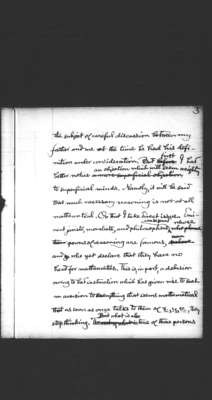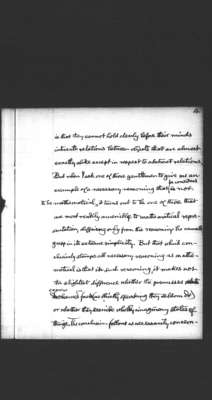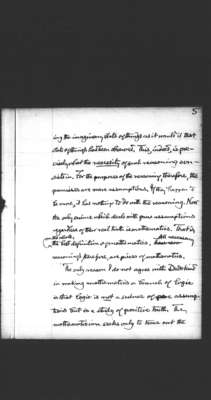Pages
1
1
Ladies and Gentlemen:
Mathematics is the science which draws necessary conclusions. Such was the definition given first by my father as early as 1870. At that day, when the new mathematics was in its infancy, the novelty of this definition was disconcerting even to the profoundest mathematicians; but today nobody would propose a definition differing much from that. The only doubt that should entertain is whether we ought to recognize as part of mathematics, what is certain a most important part of the mathematicians business, the formation of the assumptions on which his reasoning is to be based.
Some of the mathematicians who have
2
the most deeply studied the fundamenetals of their science have even gone so far as to pronounce mathematics to be a branch of logic. Dedekind is one of these whose little books published in one volume in translation by the Open Court Company, which is doing so much for American culture, I should strongly recommend to your attention. The fact that so profound a mathematician can hold this opinion is a sufficient justification of my devoting several luctures of this short course to a study of the nature of mathematics.
I do not quite agree with Dedekin, myself; and I will tell you why presently. The question of whether mathematics was a branch of logic was
3
the subject of careful discussion between my father and me at the time he had his defi nition under consideration. But first I had better notice an objection which will seem weighty to superficial minds. Namely, it will be said that much necessary reasoning is not at all mathematical. On that I take direct issue. Emi nent jurists, moralists, and philosophers can be found whose powers of reasoning are famous, and who yet declare that they have no head for mathematics. This is, in part, a delusion owing to bad instruction which has given rise to such an aversion to everything that seems mathematical that as soon as once talks to them of x, y, z, they stop thinking. But what is also true of these persons
4
is that they cannot hold clearly before their minds intricate relations between objects that are almost exactly alike except in respect to abstract relations. But when I ask one of those gentlement to give me an example of a necessary reasoning that he considers is not to be mathematical, it turns out to be one of those that are most readily amenible to mathematical repre sentation, differing only from the reasoning he cannot grasp in its extreme simplicity. But that which con clusively stamps all necessary reasoning as mathe matical is that in such reasoning, it makes not the slightest difference whether the premises express observed facts (as strictly speaking, they seldom do) or whether they describe wholly imaginary states of things. The conclusion follows as necessarily concern-
5
ing the imaginary state of things as it would if that state of things had been observed. This, indeed, is pre cisely what the necessity of such reasoning con sists in. For the purposes of the reasoning, therefore, the premisses are mere assumptions. If they happen to be more, it has nothing to do with the reasoning. Now the only science which deals with pure assumptions regardless of their real truth is mathematics. That is, on the whole, the best definition of mathematics. All necessary reasonings, therefore, are pieces of mathematics.
The only reason I do not agree with Dedekind in making mathematics a branch of logic is that logic is not a science of pure assump tions but is a study of positive truth. The mathematician seeks only to trace out the




